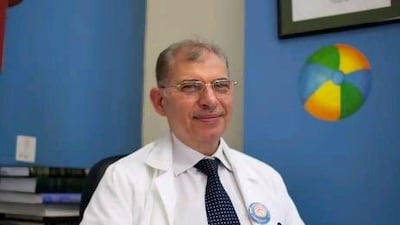ABU DHABI // Expatriates are in danger of developing chronic and life-threatening diseases because their health insurance does not cover preventive screening.
Emiratis are eligible for screening for most conditions through their Thiqa insurance, but tests for expatriates are generally limited to prostate and breast cancer.
Daman, the national insurance company, covers breast-cancer screenings for women 35 and older, and prostate-cancer screenings for men 45 and older in its premium plans.
Under Daman's basic Abu Dhabi plan, which is mainly for blue-collar workers, those tests are not covered.
All other forms of screening, including those for heart disease and diabetes, are excluded unless a person is at high risk of developing the disease or is already exhibiting symptoms.
Dr Wael Al Mahmeed, head of cardiology at Sheikh Khalifa Medical City, said such screening was insufficient.
"Waiting for someone to exhibit symptoms often means waiting until it is too late," Dr Al Mahmeed said. "We need insurance companies to cover screening so that we can prevent patients from reaching a point where they need hospital care."
Prevention is deeply ingrained in western public health care. In the US, cervical-cancer screenings and mammograms are covered by 49 and 48 of the 50 states as part of Medicaid, the country's public insurance programme for the poor.
Four other preventive services covering diabetes, high cholesterol and colorectal cancer are offered to adults by three-quarters of the states. There are also independently run national preventive screening programmes.
Compulsory health insurance in the UAE is relatively new, said Dr Michael Bitzer, the chief executive of Daman. It was introduced in Abu Dhabi in 2006 and there is no equivalent in any other emirate.
"With health insurance you always need to find the right balance between what the people would like to have and the economic situation," Dr Bitzer said.
"We needed to keep the policy affordable for employers."
Insurance is regulated by the Health Authority - Abu Dhabi (Haad).
"The basic product secured the minimum, must-have health insurance for individuals in Abu Dhabi," said Mahmoud Abu Raddaha, the section head of government prices and product benefits at Haad.
"You want to make sure you don't overwhelm the employer with the cost of the health insurance. To reach the balance, you have to limit it to must-have health care that can be offered at a fairly low cost."
In Dubai, where insurance is not required by law, most major insurance companies develop their plans according to an employer's budget and staff profile.
Mustafa Vazayil, the managing director of Gargash Insurance, explained how paying for screening affected premium levels.
"Let's say you have a large corporation with a staff of 1,000, of which half are male," Mr Vazayil said. "If breast-cancer screening were to be included, that would raise the premium by about Dh200 per employee.
"Group plans are comprehensive. You can't choose which employee gets what benefits, meaning an additional Dh200,000 for the employer."
Screening for heart disease and diabetes costs about Dh2,000, but treating a single patient with serious heart problems costs more than Dh70,000 a year, according to a doctor at Welcare Hospital in Dubai.
Daman's biggest expense in its basic plan is covering diabetes in men.
Nearly a quarter of all deaths in the UAE are the result of cardiovascular disease (CVD). Statistics provided by Haad from 2010 show close to one in four expatriates may develop CVD and one in five has diabetes, which is a risk factor for CVD.
A 2010 report by the international healthcare provider UnitedHealth shows diabetes could cost the country nearly Dh4 billion a year by 2020. By then, it is also forecast that one in three people, Emirati and expatriate, will be affected.
Rigorous prevention programmes are also needed for cancer, the second-leading cause of death for women, after heart disease.
In 2009, 67 per cent of cancer cases in Abu Dhabi emirate were among the expatriate population. Nearly half were women, with breast cancer accounting for most, followed by cervical cancer.
Subsidising screening programmes so that people are not wholly reliant on insurance could reduce the rate.
Dr Karim Elmasry, a consultant gynaecological oncologist at Tawam Hospital, has been working with Haad to develop a cervical-cancer screening programme that will include existing vaccinations.
Expected to begin in the next three months, the programme will be aimed at married women and offer screenings every three years up to the age of 49, and every five years after that.
The number of cervical-cancer cases has dropped between 60 and 70 per cent in countries that have implemented a national screening programme, coupled with vaccinations, Dr Elmasry said.
"The difference between screening for cervical cancer and other cancers is that in cervical cancer you're detecting pre-malignant cells," he said. "This number reflects the top of the pyramid, those that have progressed to cervical cancer."
Of the 8,000 pap smears at Tawam last year, abnormal cells were detected in between 10 and 12 per cent of cases, evenly distributed between nationals and expatriates.
"This is what we try to explain to health economists," Dr Elmasry said. "We're preventing these thousands of abnormal smears from potentially developing into cancer."
Officials at Haad said the "door is always open" to amend the list of benefits that comes with Daman's basic product.
"We established a committee that studies the benefits and insurance for every single product," said Sultan Al Dhaheri, director of health system financing.
"There is nothing as a benefit or exclusion that we cannot change."

